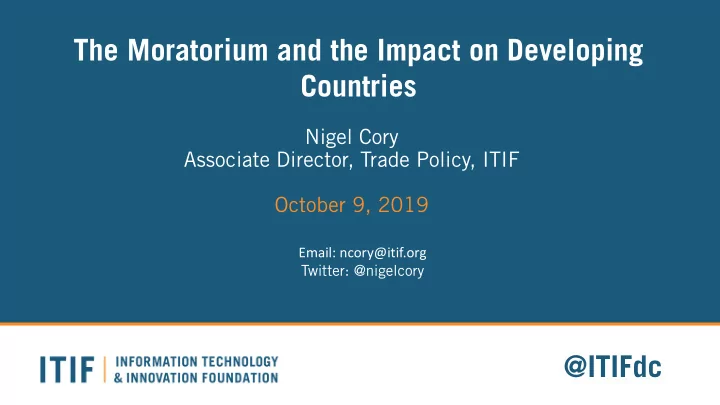

The Moratorium and the Impact on Developing Countries Nigel Cory Associate Director, Trade Policy, ITIF October 9, 2019 Email: ncory@itif.org Twitter: @nigelcory @ITIFdc
About ITIF Independent, nonpartisan research and education institute focusing on intersection of technological innovation and public policy, including: – Innovation and competitiveness – IT and data – Trade and globalization – Life sciences, agricultural biotech, and energy Formulates and promotes policy solutions that accelerate innovation and boost productivity to spur growth, opportunity, and progress World’s top think tank for science and technology policy, according to the University of Pennsylvania’s authoritative Global Go To Think Tank Index 2
Overview: Assessing the Potential Impact of Digital Duties Remarks based on: – GTIPA Project; – Discussions with other stakeholders – governments and firms; – Includes think tanks from South Africa and India. 3
Direct Economic Costs: Productive Inputs Targets a new “general purpose technology” which drives economic productivity and innovation. Cost is a key driver of adoption. – Basis for cutting tariffs on ICTs as part of Info Tech Agreement. Economy is data-driven = > transitioning to algorithmic economy. Concerning for policymakers/firms focusing on: – Encouraging adoption of digital technologies (especially cloud) and – Efforts to develop/exploit own digital/AI products and capabilities. 4
Indirect Impact Time, cost, and complexity of compliance: – Customs declarations from firms/intermediaries? Every import or periodically? Technical complications and impact: – E.g., Imports by automated systems. Single download can involve data from several places. – Broader network impact: Potential for automatic re-routing of data away from certain countries – impact on ICT infrastructure. Enforcement: – Blocking access/data flows and/or government monitoring. 5
Example: Multimedia Goods & Retail E-commerce Technology allows much easier, better digital productions. Platforms allow easy regional/global digital distribution. – Whether for purely digital products: music, movies, apps, or video games. – Or digital products enabling tangible trade: value-added services allow sellers to find, understand, and target customers on retail ecommerce platforms. Highlights the current opportunity of firms, especially SMEs, from developing countries to leverage power of platforms to engage in global digital trade (economies of scale). 6
Example: Software Development and Semiconductor Testing Software development: – An iterative process involving the daily transfers of digital products to various units/partners/customers in different countries. (E.g., 24/7 production model). – Firms from developing countries can play role in global production. Broader sectoral implications: manufacturing/services networks. – E.g., semiconductor testing - software, architecture, and other design and testing software flows between units around the world. – India – designs nearly 2,000 chips annually and more than 20,000 engineers are working on chip design and verification 7
Digitalization and Taxation Many developing countries using electronic invoices (EI). – 90 percent of invoices still paper = inefficient and often inaccurate. – EIs help government tax collection, while making firms more efficient and competitive, such as SME ‘factoring’ (selling accounts receivable). Recent APEC Report: – EI expanding across world, especially Latin America. – Chile: GoSocket. Processes 5 million EIs daily in 13 countries in Latin America. 8
Conclusion The moratorium is a concrete way to support digital (and traditional trade) given the growing importance of digitalization. Need to keep on engaging developing countries on the implications and impact – In parallel, work with them on legitimate taxation concerns and international best practices for non-discriminatory and efficient domestic tax arrangements. Also push back on those that see this issue as one part of broader agenda for (digital) protectionism-based “digital industrial strategy.” 9
Thank You! Nigel Cory| ncory@itif.org | @nigelcory @ITIFdc
Recommend
More recommend